April 6th 2012 was Good Friday – a religious day for the Christian faith.
However, it was also a good Friday for a group of student members from the Mandarin and English classes who attended a one day workshop cum meditation retreat conducted in Mandarin by Bhante Raja.
A Noble Deed
It was also a very good Friday for Sister Cheong Beng Khiam and her siblings who generously offered their abode in the Upper Thomson Road vicinity for this auspicious occasion. The place is conducive for both meditation retreat and for the propagation of Dhamma. It is also made available upon request to those who need it.
It is indeed a noble deed of the incumbents to emulate the great deed of Anăthapindika who purchased Jetavana Grove from Prince Jeta with a handsome price of the number of gold coins that covered the park. A monastery was built upon the land as a gift to Lord Buddha who spent twenty four raining seasons at the Jetavana Monastery.
Although the benefactors’ infinitesimal deed paled in comparison to the gift of Anăthapindika, it is still a meritorious deed and even more magnanimous vis-a-vis in wealth.
Programme
The day’s programme began with registration of the participants at 7:30 am followed by a workshop at 8:00 am on rudimentary mediation for beginners. The elucidative presentation with visual aid like slides made the lessons easy for both the young and old participants ,to comprehend. A question and answer session gave participants an opportunity to seek clarifications on any doubts they may have.
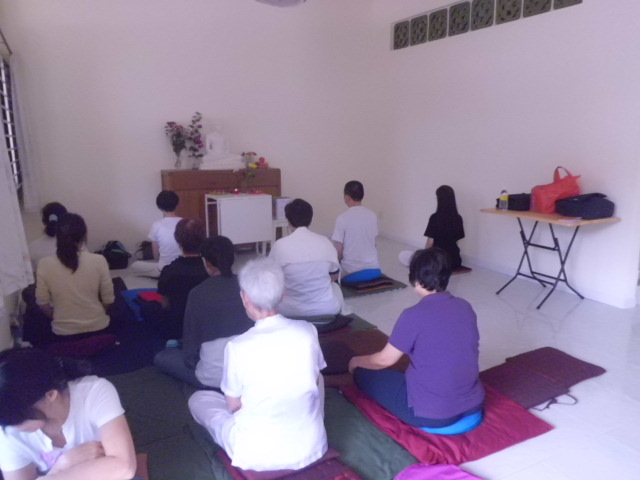
Meditation session in progress
Puja, Sanghika Dana and Lunch
At 11:00 am Bhante Raja conducted a puja, which concluded with the transferring of merits to the departed. Attendees were also given an opportunity to participate in sanghika dana by offering food to the sangha and in return received blessing from the Bhante.
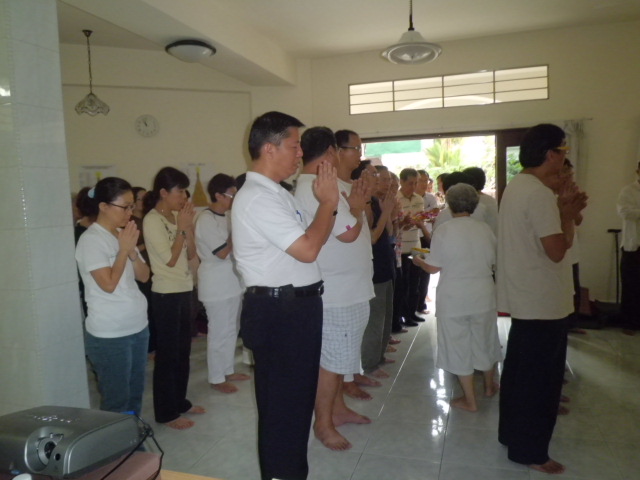
Morning puja
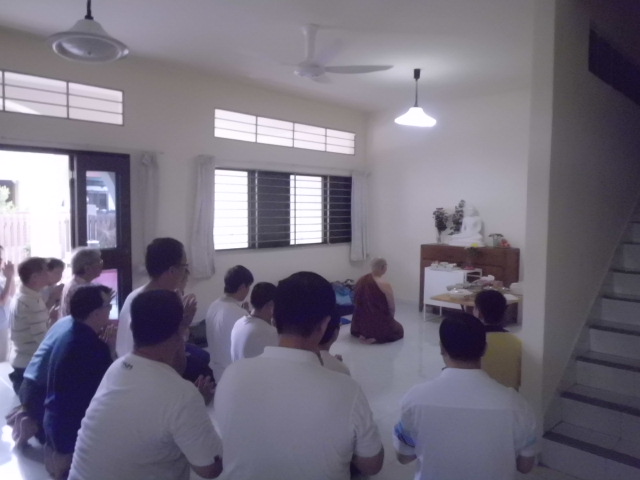
Morning puja
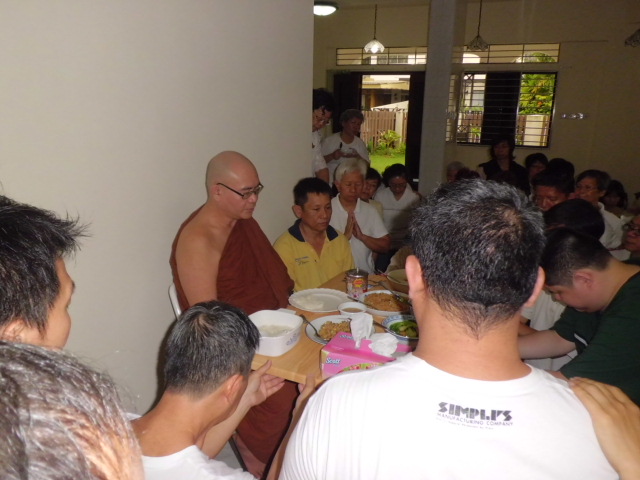
Sanghika dana
Lunch was served at 11:30 noon to hungry attendees in order to sustain them through the rest of the training programme.
“All beings are maintained by nutriment (aharatthitika), Digha Nikaya, Sutta 33 – Sangiti Sutta – The Chanting Together.
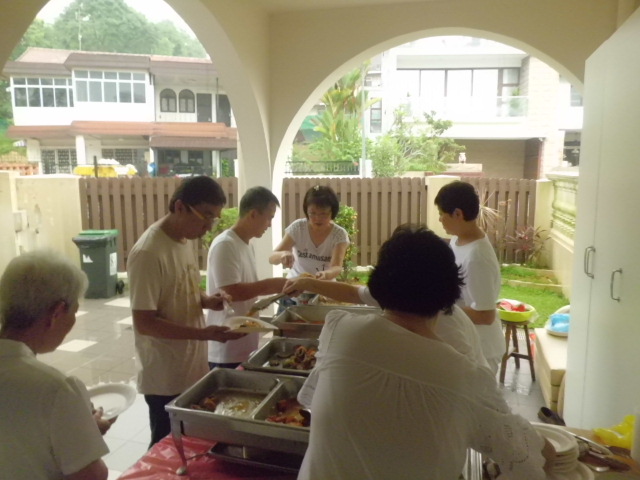
"All beings are maintained by nutriments" D.N. 33
A spread of sumptuous food to tease the taste buds as, “They always take delight in food, both devas and human beings. So what sort of spirit could be, that does not take delight in food?” (Samyutta Nikaya – Sutta 1 Devatasamyutta – Connected Discourses with Devatas). “All beings are persisters by food.” Aňguttara-Nikaya, X, III, 27.
Of course food was consumed in moderation and with mindfulness “with reflection and judgment, not for sport, not for indulgence, not for personal charm, not for beautifying, but just enough for the support, for the upkeep of body, for its resting unharmed, for helping the living of the God-life.” Aňguttara-Nikaya, IV, XVI, 159.
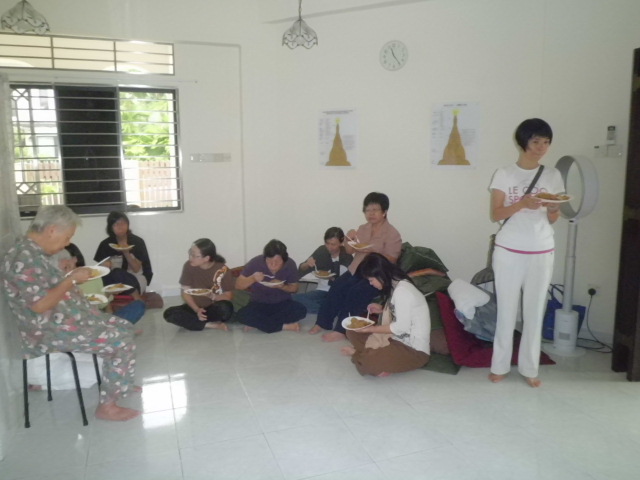
"They always take delight in food, devas and human beings." A.N. X,III, 27
Practice Session and Group Interview
The afternoon session commenced at 1:00 pm after a short break with another workshop followed by practice. Participants mediated for about two hours. Questions raised on their experience and phenomena encountered during their practise were promptly answered by Bhante Raja during the group interview.
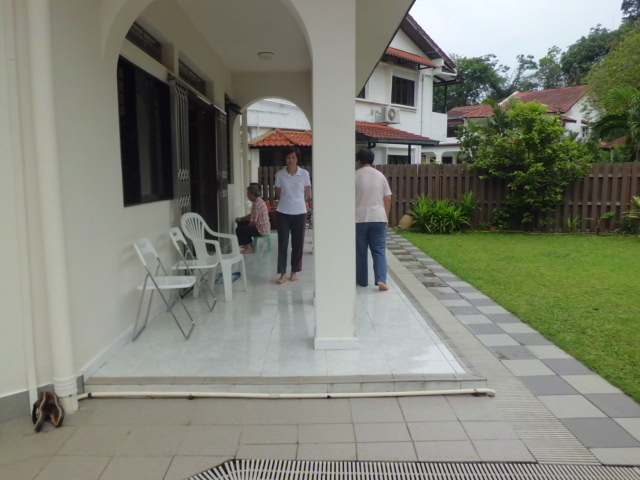
Walking meditation
Advice
Bhante Raja advised that regular practice is necessary to achieve result. “Just as rain cannot penetrate a well-roofed house, so also, passion (raga) cannot penetrate a mind well-cultivated in Tranquility and Insight Development (Samatha and Vipassana).” (Dhammapada, Verse 14, Nandatthera Vatthu). Nevertheless, it was a good starting point to learn and gain experience.
It is hoped that more workshops on intermediate and advanced stages of meditation can be conducted in the future. However, as practice is more important than theory, constant practice is the key to success as Dhammapada Verses 19 and 20 aptly say: “Though he recites much the Sacred Texts (Tipitaka), but is negligent and does not practise accordingly to the Dhamma, like a cowherd who counts the cattle of others, he has no share in the benefits of the life of a bhikkhu.” “Though he recites only a little of the Sacred Texts (Tipitaka) , practices according to the Dhamma, eradicating passion, ill will and ignorance, clearly comprehending the Dhamma, his mind freed from moral defilements and no longer clinging to this world or to the next, he shares the benefits of the life of a bhikkhu.” (Dvesahăyakabbhiku Vattu).
Contributor: Chin Kee Thou



